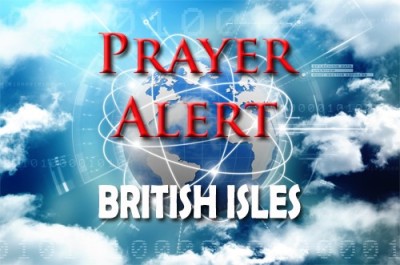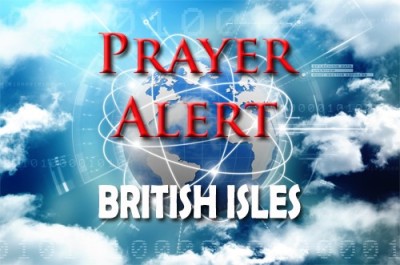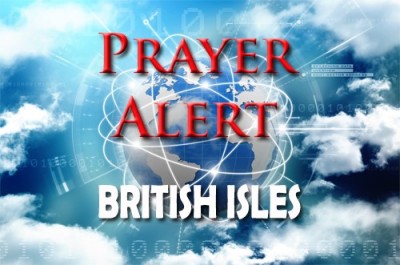Dear Friends,
On behalf of the IPC Council, Board and our 14 Regional Councils, may I wish you and your family a Happy, Blessed Easter!
You may well be aware that during Ramadan (Mar 10 - Apr 8), we are praying for advances in the sharing of the Gospel across the Muslim world. We are praying each day for unreached people groups across 30 key Muslim cities.
See the Adults and Children's Prayer Guides.
'Ramadan to Resurrection Sunday!' - Prayer Guide
By way of a gift, I am pleased to bring you a short encouragement and exhortation to go deeper as you pray with many millions of believers from around the world!
The guide brings some clear scriptural pointers to guide you as you pray both for friends, family and neighbours but also for many that you cannot see among the unreached people groups.
'Ramadan to Resurrection Sunday!' can be downloaded HERE
I trust you will be blessed, challenged and encouraged as you use it!
 One Miracle Night - Global Day of Prayer for the Muslim World. Friday 5th April 2024 6am Pacific (UTC-8)
One Miracle Night - Global Day of Prayer for the Muslim World. Friday 5th April 2024 6am Pacific (UTC-8)
I also want to invite you to join us for a Global Day of Prayer for the Muslim World - taking place from Friday 5th April 2024, 6am Pacific time.
Across the 24 hours, we will be praying for 24 key unreached Muslim cities.
You can pray with your family, from your home, at work, in your house church, local church, house of prayer, prayer tower, etc.
We provide this brief prayer guide with links to online resources plus a children’s prayer - and suggest that you pray as the Lord leads you.
We encourage you to use the 'BLESS - Pray for 5 Card' that helps us to remember to pray for up to 5 family, friends, colleagues to become Jesus followers.
Our Prayer Vision for 2024...
This is the second of 4 seasons of focused prayers planned for 2024 - for the Buddhist, Hindu, Jewish and Muslim peoples.
IPC discovered through field-driven research that 90 per cent of the remaining unreached people groups in our world today live in or near 110 mega-cities!
We want to mobilize prayer on behalf of the unreached peoples of these cities, praying for Christ-exalting churches to be planted, one church planted per thousand people during these 4 global days of prayer!
Pray and Worship with us Online!
You can also join us online during 'One Miracle Night' (5th April) if you would like - to pray with gifted children and men and women of prayer from around the world at the Global Family 24-7 Prayer Room! (registration required)
Your Prayer Matters! - God releases His power in response to the prayers of His people!
Let’s join our voices before the throne with millions of believers in Christ-exalting, Bible-based, Worship-Fed, Spirit-led prayer and believe God to do immeasurably more than all we could ever ask or even imagine - all for His Glory, for our Joy and for the salvation of multitudes of people amongst the Muslim world!
For the Supremacy of Christ in all things!
Dr. Jason Hubbard – Director
International Prayer Connect
www.linktr.ee/ipcprayer
Thousands baptised after watching journey from addiction to redemption
'The Blind,' a film detailing 'Duck Dynasty' star Phil Robertson's journey from alcohol addiction to redemption, has profoundly influenced thousands, his daughter-in-law Korie Robertson reports. The film explores Phil's tumultuous life, marked by anger, addiction, and instability, until his transformative surrender to Jesus. Its raw honesty showcases the Robertson family's struggles and triumphs, emphasising God's steadfast faithfulness. The impact has been significant, with many viewers experiencing spiritual awakenings, overcoming personal demons, and mending relationships. Numerous baptisms have taken place, some in the river behind Phil's home, a testament to his ongoing dedication to faith. Through many challenges, the family has remained steadfast in their Christian beliefs, drawing strength from their faith and community. Committed to promoting adoption and foster care, Korie and her daughter Sadie will speak at The Chosen conference, reflecting their dedication to family and faith.
‘How great thou art’
Celebrating its 75th anniversary, the classic hymn 'How great thou art' has been revitalised by worship leader Matt Redman and an ensemble of renowned Christian musicians. This contemporary remix showcases the song's enduring appeal in Christian communities. Redman, in his interview with CBN News, reflected on the hymn's widespread impact, especially its growth after being featured in Billy Graham crusades. He believes its timeless nature stems from its narrative, spanning from creation to the cross, offering a blend of education and inspiration. Redman revealed the English lyrics were written by British missionary Stuart Hine in Ukraine, adding historical depth. This hymn is a traditional Swedish hymn, spread across Europe by Swedish missionaries. With the ongoing conflict in Ukraine, proceeds from this new version will support humanitarian efforts in eastern Europe. This 2024 rendition also introduces a new section designed to resonate with Christians in today's tumultuous world. Redman has praised the collective effort of the artists involved, bringing new life to this beloved hymn.
Easter messages of hope and service from Canterbury and the Palace
In their Easter messages, Justin Welby and King Charles addressed themes of hope, service, and community. Archbishop Welby, in his Easter letter, reflected on the enduring message of the scripture 'Feed my sheep' (John 21:15-17). He stressed the importance of the Church's pastoral care, despite its historical shortcomings, including conflicts and persecution. Welby's message was shaped by his experiences in conflict zones like Jerusalem, Armenia, and Ukraine, emphasising the despair and trauma faced by people there. But he highlighted the resilient hope found in Jesus Christ, the shepherd, urging Christians to avoid despair and embrace the peace and reconciliation offered by Christ. King Charles, in a recorded message for a Maundy Thursday service at Worcester Cathedral, praised those extending friendship and care, especially during times of need. He emphasised service to others, echoing his coronation vow. See
Chinese-backed cyber attacks 'unacceptable'
The Government has publicly accused China of cyber attacks on the electoral commission and MPs, a move described as an 'unacceptable' assault on UK democracy. Intelligence services suggest these attacks, likely conducted by Chinese spies, were aimed at targeting critics of Xi Jinping’s regime. In response, the UK has sanctioned individuals and a company associated with the hacking group and summoned China’s ambassador. The attacks, first identified in October 2022, had breached the electoral commission’s systems since August 2021, potentially exposing voter data. The National Cyber Security Centre (NCSC) believes they were part of China’s large-scale espionage efforts. While they did not impact the UK’s paper-based electoral system, they posed significant threats to individual security. Rishi Sunak described China as presenting an 'epoch-defining challenge’, echoing concerns over its aggressive international behaviour.
Cabinet mini-reshuffle after two ministers quit
Rishi Sunak has had to make a cabinet reshuffle after two Tory ministers announced their resignations. Robert Halfon, the skills minister, has decided to step down at the next general election. Known for his advocacy of blue-collar Conservatism, he has been a prominent figure in the party. James Heappey has resigned as armed forces minister, having already announced plans to leave parliament. He praised the armed forces and MOD civil servants, reflecting on his tenure and the ongoing need to support Ukraine. The reshuffle includes moving Nus Ghani to be minister for Europe and Leo Docherty to the ministry of defence. To date 63 Conservative MPs, including notable figures like Theresa May and Sajid Javid, have said they plan not to contest the next election. Sunak commended Heappey's contribution to the Government's defence agenda and acknowledged Halfon's commitment to apprenticeships and social mobility. The departures add to the challenges facing Sunak, as the Conservative Party trails significantly behind Labour in polls. See






